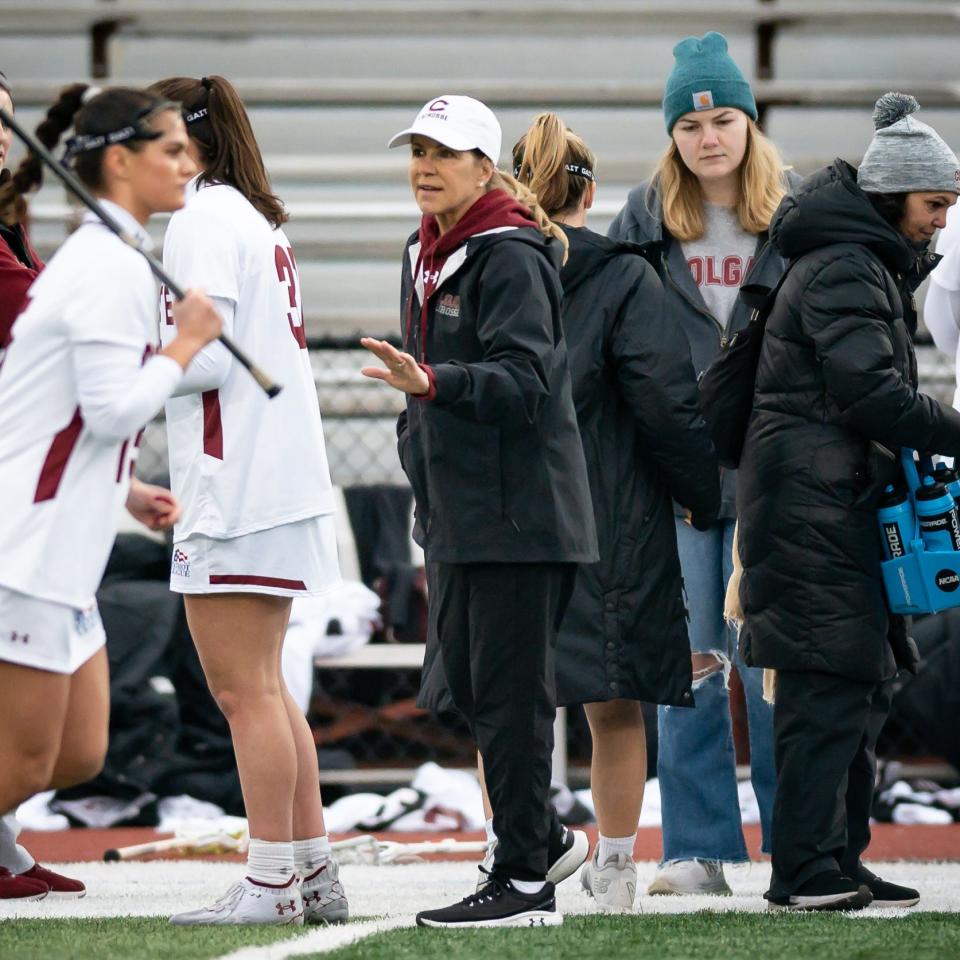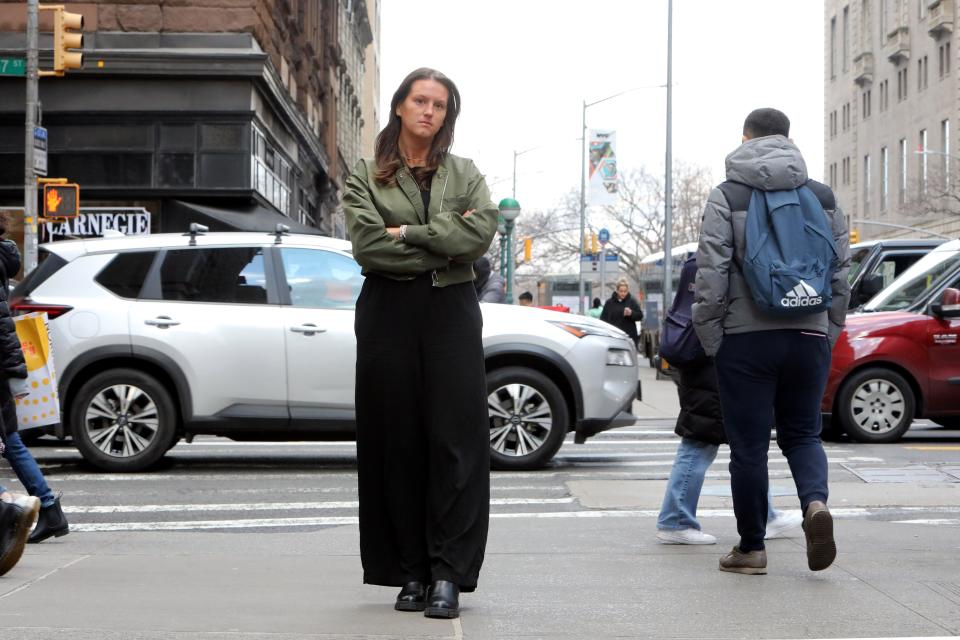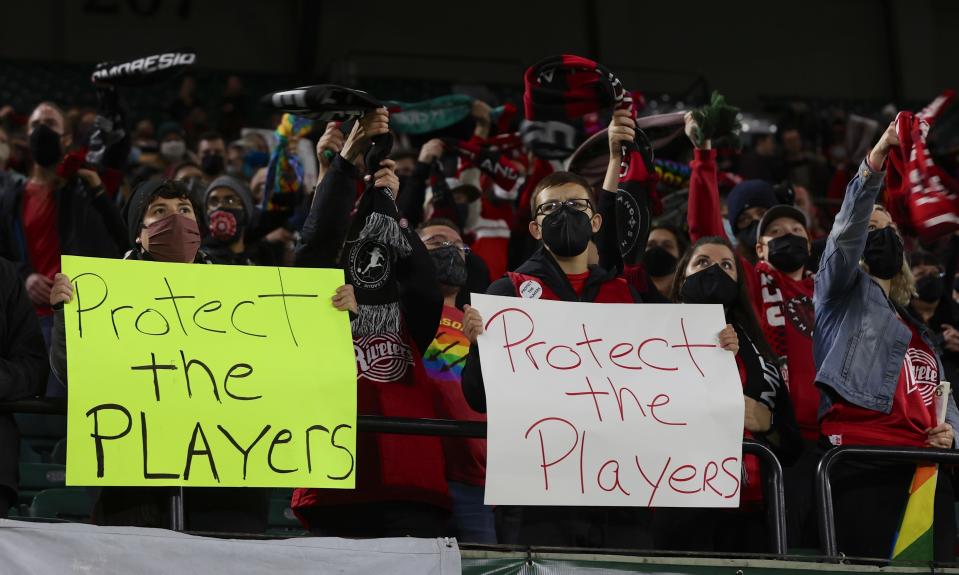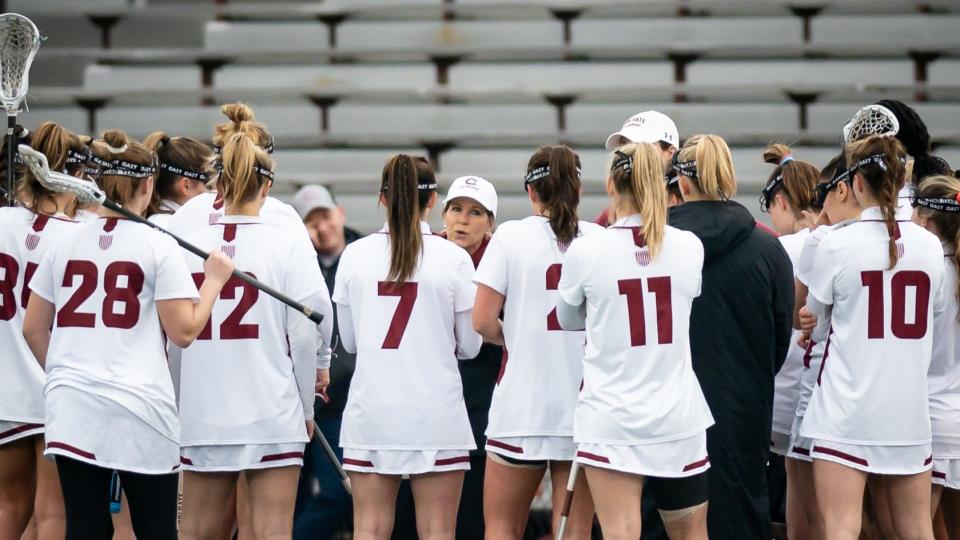Coaching abuse pervasive in pro, college athletics. What's being done to address it?
In late January of this year, longtime Harvard University women’s ice hockey coach Katey Stone was under fire. Sixteen players in a Boston Globe report alleged that Stone was insensitive to mental health concerns, and guilty of body shaming and making a racially insensitive comment.
A locker room tirade recently led to a university review. News that Stone would be kept on as head coach elicited swift backlash from ex-players. A new report from The Athletic outlined a hazing culture within the program that included a “naked skate” ritual. A player described the program as “mental-health Hunger Games.”
And, just last month, 27 former players for Indiana State University’s women’s soccer team publicly accused their former head coach Julie Hanley of years of psychological, verbal and emotional abuse. Hanley stepped down from her post in December 2022 after seven seasons to “pursue other opportunities,” according to a university statement.
These stories are examples of an oft-repeated cycle in college sports.

Athletes come forward with abuse allegations, and a university investigation follows. What happens next varies. Sometimes a coach is fired. Other times, the coach remains at the helm of their programs with new rules to remedy past mistakes. In several cases, a coach leaves a program on good terms, with no public mention of why.
These issues, experts say, are not new and are happening in athletic departments nationwide.
“This is a problem,” said Martin Greenberg, an attorney who has overseen dozens of cases detailing allegations of abusive coaching. “I thought, with the amount of writing and publicity that we have received with respect to trying to pound this out, I would have thought that this has gone away.”
Yet, every month, Greenberg said, he finds himself on the receiving end of a call about an abusive coach. “It continues, and there hasn't been enough punitive action taken by the universities or NCAA to basically root this out of college athletics,” he said.

Last week, several former Colgate University women’s lacrosse players spoke out publicly for the first time in a USA Today Network investigation, alleging Colgate’s head women’s lacrosse coach, Kathy Taylor, created a toxic environment for their team.
Among the findings:
Several players said Taylor shamed them over their weight, dismissed their mental health concerns and pushed them to play through injuries, according to their firsthand accounts. The USA Today Network interviewed 10 former players for the investigation, six of whom agreed to be named.
Twenty players have left the team before graduation since Taylor took the helm four years ago, according to a list provided by former Colgate players and a review of team rosters.
Taylor “bullied, manipulated and psychologically abused numerous players, with severe consequences to their physical and mental health,” according to a March 2022 letter sent to the university from Andrew Celli of Emery Celli Brinckerhoff Abady Ward & Maazel, a Manhattan law firm. The law firm last year investigated allegations from six former players, prompting Colgate to conduct an investigation of its own.
The findings of that internal investigation, completed last summer, have not been made public. Taylor remains at the helm of Colgate women’s lacrosse.
Taylor has declined multiple requests to comment for the story. In an Instagram post published last week, and labeled "Kathy Taylor sets the record straight," Taylor acknowledged that her leadership "has been publicly and privately scrutinized," but that "all allegations have been investigated and cleared by Colgate University."
She denied "body shaming" athletes, and said she relies on the guidance of the university's sports medicine team to determine if a player is cleared to play.
"It is challenging to make every athlete or parent happy, but I have always treated them with respect, care and professionalism," she wrote.
Colgate, in a January statement to the USA Today Network, said the university was making specific changes to the lacrosse program in the interest of players, with Taylor’s full support.
On Tuesday, Colgate Women's Lacrosse issued a public statement doubling down on its support of Taylor in response to the USA Today Network report.
"Since the conclusion of the review, the University has not received any similar reports or concerns from current student-athletes about Coach Kathy Taylor or any other member of the coaching staff," the statement read, referencing its independent investigation of the allegations last year.
"Colgate is committed to supporting a healthy and positive experience for all our student-athletes and Coach Taylor has demonstrated her commitment to this by implementing measures identified by the University to improve the overall strength of the program."
Read the investigation here.
If you've had a negative or hurtful experience with a college-level athletics coach in New York, we want to hear from you. Fill out this online form, and your response will go directly to a USA Today Network reporter.
Allegations piling up across U.S. athletics
Allegations like these are growing – and are happening at a time when the narrative surrounding what it means to be an athlete, and what appropriate coaching tactics are, is changing.
With high-profile cases of suicide in college athletics sparking calls for the NCAA to intervene, and pro athletes prioritizing their own mental health on the national stage, there is now a heightened awareness for prioritizing player safety and mental health in sports. Because of this, athletes and their families are more willing to speak out against institutions and organizations they say failed to protect them.

Greenberg, a Wisconsin-based attorney, said he has worked on 22 cases of alleged coaching abuse in the last five years. His first case involved a whistle-blowing complaint by an assistant coach at Penn State University. The complaint eventually led to the dismissal of the university’s head coach for women’s gymnastics, but only after years of strife.
In 2016, Greenberg wrote a letter to former NCAA president Mark Emmert calling for an end to physical and mental abuse by coaches in college athletics. In the letter, he described coaching abuse as an “endemic problem.”
The NCAA did not respond to questions for this story, or questions about Greenberg’s letter.
“This happens in men's sports. It happens in women’s sports. It happens in lacrosse and soccer,” Greenberg said. “There needs to be training on the part of coaches as to these issues, and what they can do and what they can't do.”
The problem is so widespread, movements at the grassroots level have grown. There are websites like EndAbusiveCoaching.org and SpotASpider.com that offer resources for parents and players. Experts have come together on podcasts to discuss ways to fix the problem. There are countless books written about the issue.

A university’s slow or inadequate response to accusations of abuse by student athletes can be counterproductive, as the same administrators who are encouraging athletes to speak up, may be ignoring them when they do.
In the case of Colgate women’s lacrosse, lawyers representing several players said last week that they had not seen the results of the university’s investigation.
“We know what students who were on the team and students who have graduated have experienced. But we don’t know what else Colgate knows,” said Andrew Celli of Emery Celli Brinckerhoff Abady Ward & Maazel. “So we are very disappointed in the outcome. And it causes us to think that the process was not fair, or complete, or accurate.”
The discussion around abusive coaching boomeranged into the national consciousness in 2022, when multiple college players committed suicide in the spring, including Robert Martin, a graduate student at Binghamton University and a fifth-year goalie for the Bearcats. The cases are so widespread that current and former college athletes called it a “mental health crisis for college athletes” in a story in The Washington Post in May 2022.
In October of last year, U.S. Soccer released its findings from a U.S. Soccer-commissioned investigation into allegations of abuse in the National Women’s Soccer League.
The report, led by investigator Sally Yates, a former U.S. deputy attorney general, details the systemic failures in professional women’s soccer that allowed for predatory coaches to thrive in the league, going from team to team with little consequence. The findings, referred to by many as the "Yates report," also alluded to these failures extending as far as youth soccer.
What are some solutions for athlete safety?
Mitch Lyons, a retired attorney from Massachusetts and one of the founders of the End Abusive Coaching campaign, found himself drawn to this issue when his adult children were in high school. His advocacy began when his daughter, then 16, played for an abusive coach, he said.
“I just started seeing how obvious what the problem was,” Lyons said. “ There's nothing in writing, because there's no common thread running through a school district’s sports teams. Like one parent told me, ‘It’s a total crapshoot when I put my kid on a sports team,’ [and that’s] because it's totally coach dependent.”

The End Abusive Coaching campaign advocates for state legislation to implement a social and emotional learning curricula in middle and high school athletic programs. Doing so, Lyons argues, would spark systemic change because “college teams with an abusive coach would not attract informed and educated athletes.”
Through education, athletes would learn from a young age how to identify abusive coaching or other unsafe environments.
“I'm focusing on high schools for the very reason that they are an essential pin – a linchpin, you might say – for a sports career,” Lyons said. The system would eventually trickle down to youth sports because those programs "would copy what's going on in high school because they want their kids to play" at that level, he added.
Furthermore, focusing on the high school level is key, Lyons said, because the public generally has leverage in districts funded by taxpayers.
Several Colgate players told the USA Today Network their coach, Kathy Taylor, dismissed their mental health concerns – all in the wake of a pandemic that already left athletes feeling isolated.
Many players left the team, including Lauren Marandett, an attacker from Wellesley, Mass., who arrived in Hamilton in the fall of 2019.
Marandett said the ordeal at Colgate changed how she views college athletics.
“I realized the way athletic departments work, and how the well-being of athletes isn’t prioritized,” Marandett said. She continued, “When the whole investigation was going on, and how many steps it took to get the school to even acknowledge there was a problem and then come to the conclusion that it doesn’t matter how the student athletes feel.”
Melanie Anzidei is the Sports Enterprise reporter at NorthJersey.com and The Record. Reach her at anzidei@northjersey.com or on Twitter @melanieanzidei.
Noah Ram is the sports reporter for the Utica Observer-Dispatch. Reach him at nram@gannett.com or on Twitter @Noah_ram1.
Thomas C. Zambito is a reporter on The USA Today Network's New York State Team. He can be reached at tzambito@lohud.com.
This article originally appeared on NorthJersey.com: Coaching abuse pervasive in U.S. college athletics. What's being done?

